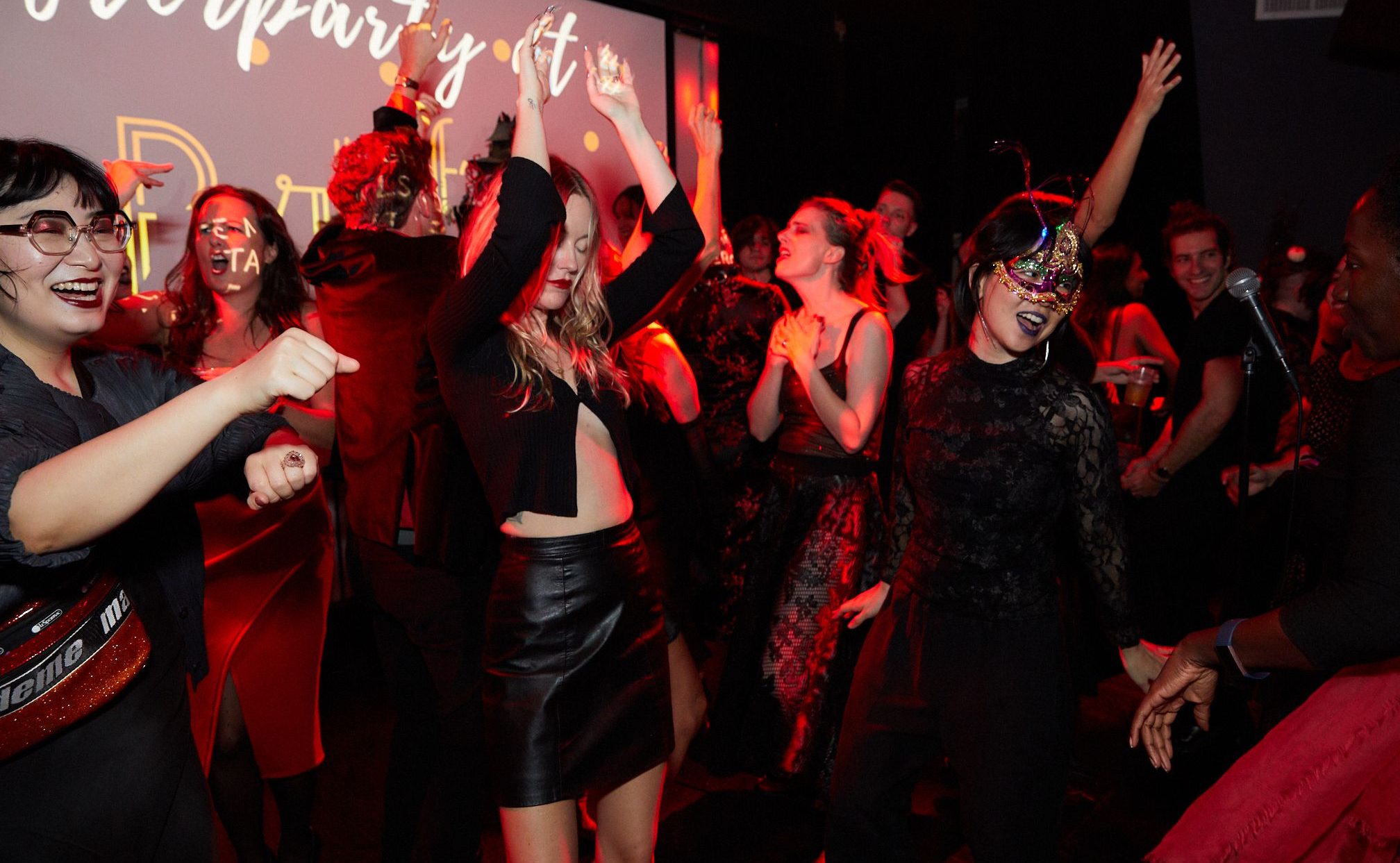news
Fence Magazine’s Spring Issue Launch at Housing Works

1. Novelist, short story writer, and editor Lynne Tillman. On Fiona Maazel: “I love your imagination. It also terrifies me.” 2. Fiona Maazel, reading from “Screen.” “I know what happens to boys in a public bathroom, I know the face of evil.”
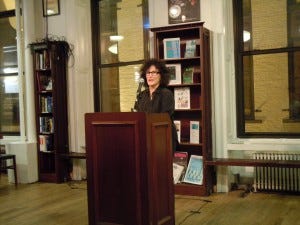
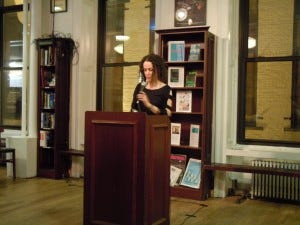
Fence Magazine is primarily a poetry journal, but for fifteen issues the SUNY Albany publication has had the inimitable Lynne Tillman as its fiction editor, and the Spring 2012 issue launch reading at Housing Works in SoHo doubled as a farewell salute to Tillman, as the forthcoming issue is her last as Fence’s fiction editor. The readings from Fiona Maazel (Last, Last Chance; Woke Up Lonely, a novel, is forthcoming), James Yeh (co-founding editor of Gigantic; he also has a kickass story in the latest issue of NOON), Elizabeth Koch (co-founder of Opium Den and Black Balloon), and Paul Lisicky (Famous Builder, and the forthcoming title Unbuilt Projects) showcased Tillman’s fictive impetus for wryly imaginative stories that skate in darker corners of the psyche.
1. James Yeh, who smiled through his whole reading, had a great time reading about Jim’s Britney-Spears-dancing dad. 2. Paul Lisicky, and Wondersauce. I just really like saying the word. Wondersauce.
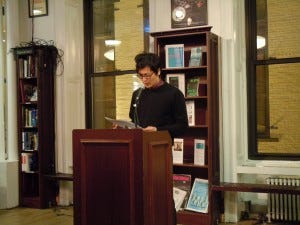
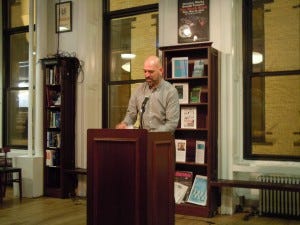
Tillman began the night by talking a little about her time at Fence. Founding Editor Rebecca Wolff’s “direction” was letting Tillman having free reign. As such, Tillman and her associate editors had a nice stint of fifteen issues “drinking wine, reading work.” The new issue has stories from Yeh, Koch, and Lisicky and a previously unpublished play by Denis Johnson. Tillman said her time at Fence was propelled by publishing stories that had “A certain kind of intelligence–emotional intelligence, literary intelligence … there’s a reason to read these stories. It’s given me something.” Indeed: all four writers’ imaginations were subtly and quietly massive, delightfully and terrifyingly so.
Fiona Maazel read her story “Screen” from the Fall 2011 issue. “If you don’t like what I’ve read, rest assured it gets better,” she assured us. “Screen” follows Barry, an X-Ray body scanner operator at Long Island MacArthur airport, where “ninety percent of [the] traffic is people [he] grew up with.” Barry soon leaves that job after he unintentionally reveals his friend’s wife has been taking birth control while “trying to get pregnant via IVF for months.” Later, he is a security officer. “Was it really my life’s predicament to watch people in the throes of betrayal and dissembling and do nothing about it? … And my wife, I’d seen her at a gay bay with some friends, though she wasn’t gay but hadn’t told me she was going to a gay bar either.” Maazel’s prose creeps with a casual affectivity. I mean, do we ever think twice about these people who wear blue gloves and look at our shit while we stand in our socks? How are they invaded by what they do? Maazel’s story, and the Fall ’11 issue overall, comes highly recommended.
1. Lynne Tillman with Rebecca Wolff, pallin’ around. 2. Seth Syberg and Ben Blum, both Technologists, came out to root for James Yeh.
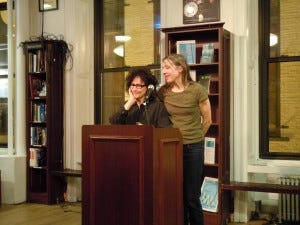
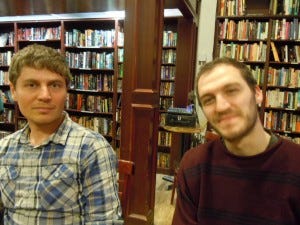
James Yeh was next, whose greatest gift from Tillman was teaching him ping pong while the two hung out at MacDowell. Yeh read his story from the Spring ’12 issue, which sees a 23-year-old named Jim returning home to South Carolina, helping his father replace insulation in the house. The narrative also teleports to San Francisco, where Jim lives, at a slightly awkward monthly family meal. While in the attic crawlspace, Jim finds a dead rat and pokes it with a wire. “Dad: Need a hand! Me: Can’t. I’m working.” Yeh’s dry punchlines alight Jim’s continual realizations that he does not really know his father, or his family; that they talk at Jim instead of with him. Jim and his aunt, speaking in Chinese: “‘You know, your father likes to dance! … He’s not bad.’ ‘What does he like to dance?’ ‘Popular music.’ ‘Like Britney Spears?’ ‘Yes. Just ask him. Ask him to dance with you!’” Jim’s family just doesn’t seem to click, and hinges on his father’s inability to express intimacy. At his father’s retirement party, Jim finally says “I love you” to his father, to which he pats Jim’s arm and says only “Good.”
Elizabeth Koch was next, and is the only former student of Tillman’s to be published in Fence. Koch said Tillman “seduced the best work” out of every writer in the class. Her best lesson: “If you’re not risking intimacy, you’re not risking anything at all.” Koch’s narrator meets up with Neil on their way to a fancy art performance at a museum. Both aren’t quite of that world: “Mocking liberal posturing pleased us very much … Like throwing everything out of your closet.” In the bathroom, the narrator runs into Lynda Carter. “My god, was that Lynda Carter? It was. She complimented my dress. It was safety-pinned to a tube top.” Carter proceeds to give her advice on child-bearing, unbeknownst that her ovaries are missing: “‘Simply consider the traits you want your children to have, and find a man with those traits’ … She stepped away, nodding in agreement with herself.” Koch’s story was so blackly funny that there weren’t grimaces or many chuckles, but an ideal form of how comedy reveals reality with guttural, instinctive responses through laughter or silence.
1. Daniel Meredith and Allye Spencer, avid readers who troll the city on their days off from slinging wine. They stumbled on last night’s reading. Rad. 2. Elizabeth Koch with an unnamed gentleman (who scurried off before I got his name) to her left and Jeffrey Zuckerman, a writer, to her right. Yay!
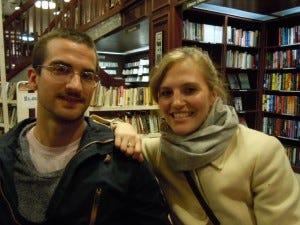
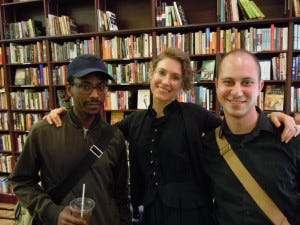
Paul Lisicky, who Tillman described as “elliptical and thorough,” rounded out the night, and he read five short-shorts about alligators and this food dressing he calls Wondersauce. They were awesome. In “Pre-Historic,” Harry’s “temporary neighborhood” is infiltrated by an alligator. As “he looked for the beast everywhere,” he unintentionally discovers beastly sights in the temporary houses. Like “the teenager rubbing meth into her gums.” My favorite of the night was “Wondersauce,” and Lisicky was visibly excited to read his two paragraph piece about a weird food. “She told herself that she went for the golf and the view, but she went for the taste of orange, lime, ginger and jalapeno.” This “wondersauce” kept Lisicky’s narrator on track and regular, though when it suddenly disappears from the menu, the result is tragedy. “The fish tasted dull and stale, like the inside of an old lover’s mouth.” Cue the audience’s quiet retch. Bad ass.
An Internet salute to Lynne Tillman for being a doer, mover, maker, shaker and curator in all things literary. You rule. Find the new issue of Fence at Housing Works (where when you drink beer and buy books you are a hero, says events coordinator Amanda Bullock) or at your local shop. Next week, catch both Fiona Maazel with Heidi Julavits, Joseph Riipi, and others at the Franklin Park Reading Series on Monday, 4/16, & James Yeh with Deb Olin Unferth, Clancy Martin, and more at the NOON reading at the Center for Fiction on 4/19.
***
— Ryan Chang is from Orange County, CA and lives in Brooklyn. He is the Staff Writer to The Outlet, and his fiction and essays have appeared in Art Faccia and Thought Catalog. He is in the internet here and here.







